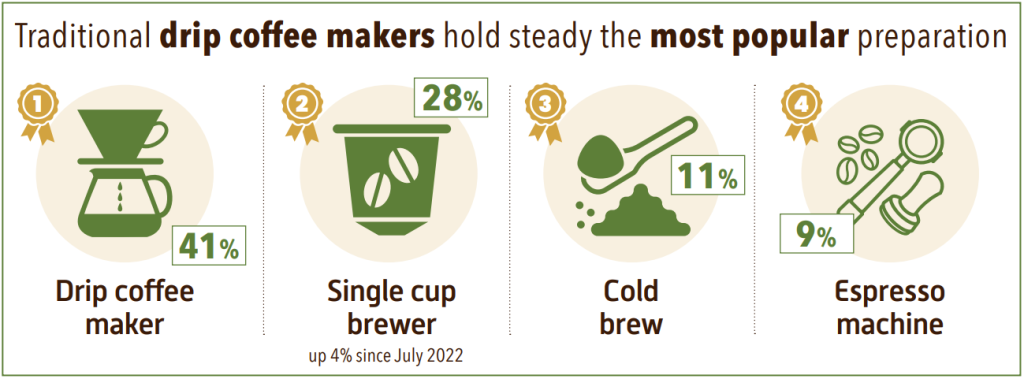It’s one of the most wonderful times of the year! That’s right, spring has sprung and the latest edition of the National Coffee Data Trends (NCDT) report is here.
Commissioned by the National Coffee Association (NCA) since 1950, the NCDT report is the longest-running study of American consumers’ coffee drinking patterns. Polling is conducted twice per year, with results released in the spring and fall, giving coffee insiders exclusive access to in-depth and up-to-date data on consumers’ coffee behaviors and also their overall perceptions, economic situations, and more.
For more than two decades, coffee has been America’s favorite beverage, and that shows no signs of changing. 65% of Americans drank coffee in the past day – more than any other beverage, including bottled or tap water!
While coffee’s overall popularity has not shown much change in recent years, this spring’s report provides an important window into coffee trends as consumers continue to emerge from the disruptions of the last several years. Spring 2023 NCDT results show that past-day coffee consumption is above pre-pandemic levels for all age groups, but some other effects remain.
The pandemic has not changed how much coffee Americans drink – 1.9 cups per person or 2.9 cups per past-day coffee drinker, about the same as in January 2020. However, the pandemic has had lingering effects on where Americans drink coffee.
In the new report, 83% of past-day coffee drinkers had coffee at home, up by 4% since January 2020. By comparison, 35% had coffee away from home, continuing to rebound from a low of 31% in January 2021, but down from 41% in January 2020.
Other changes in the Spring 2023 NCDT can be attributed to seasonal swings. Unsurprisingly, colder temperatures when polling was conducted in January 2023 resulted in some warmer cups – 84% of past-day coffee drinkers had a hot coffee, up 10% from polling in July 2022 (published in October).
Consumption of cold coffee overall (a category that includes both iced and frozen blended beverages) decreased by 13% from July 2022 to January 2023, while iced coffee itself decreased by 40%. Interestingly, frozen coffee doesn’t show the same swing, with consumption remaining steady at 11% since the summer.

Like coffee’s overall popularity, some other findings in today’s report show remarkable staying power. Drip coffee makers have been the most popular preparation method for at least the last 13 years since the question was first included in the NCDT. 40% of past-day coffee drinkers have had coffee prepared in a drip brewer.
In second place, 28% of past-day coffee drinkers used a single-cup brewer, holding steady with performance over the last few years.
Our NCDT insights don’t end there! That’s just a small sip of the data and analysis available in the full report. Stay tuned here on the NCD blog for more sneak peeks and click here to purchase the NCDT consumer research series.




